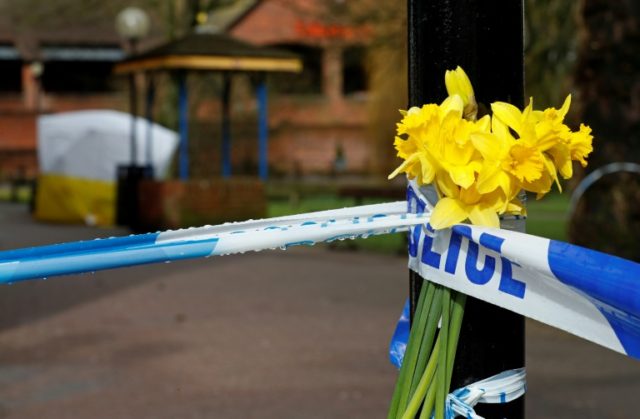London (AFP) – Russia warned the British government Monday it was playing a “dangerous game” that risked harming bilateral ties as Prime Minister Theresa May prepared to update MPs on a spy attack that politicians and the media have linked to Moscow.
May will make a statement to the House of Commons after chairing a meeting of her national security council to discuss the nerve agent poisoning of former double agent Sergei Skripal and his daughter Yulia.
Senior politicians have pointed the finger at Russia for trying to kill the 66-year-old Russian, who sold secrets to Britain and later moved here in a 2010 spy swap, prompting repeated denials from Moscow.
The prime minister has declined to cast blame while the investigation runs its course, but there is widespread media speculation that she is now set to name Russia and outline how Britain intends to respond.
“If we get to a position when we are able to attribute this attack then we will do so and the government will deliver an appropriate response,” May’s spokesman said on Monday, shortly before her statement was confirmed.
Tom Tugendhat, who chairs the House of Commons foreign affairs committee, told BBC radio: “Frankly, I would be surprised if she did not point the finger at the Kremlin.”
– ‘No issue for Russia’ –
Russia has denied any involvement, with Russian President Vladimir Putin’s spokesman Dmitry Peskov saying Monday that “it is in no way an issue for Russia”.
The Russian embassy in London warned the government’s failure to dampen speculation about the attempted murder had led to threats against UK-based Russian journalists, and risked harming long-term relations.
“Current policy of the UK government towards Russia is a very dangerous game played with the British public opinion,” it said in a statement.
This “not only sends the investigation upon an unhelpful political track but also bears the risk of more serious long-term consequences for our relations”.
Asked about the case, Putin said London must clarify its position before speaking to Moscow.
“Sort things out from your side and then we will discuss this with you,” Interfax news agency quoted the president as saying.
Skripal and his daughter, 33, remain in a critical but stable condition in hospital after collapsing on a bench in the south-western English city of Salisbury on March 4.
Foreign Secretary Boris Johnson has said the case has “echoes” of the 2006 poisoning by radiation of ex-spy and Kremlin critic Alexander Litvinenko, which London has blamed on Moscow.
That case caused a deep rift in bilateral relations.
If Russian involvement were confirmed this time, Britain could expel some diplomats, enact some kind of boycott of the 2018 football World Cup or increase British military presence in Eastern Europe.
Johnson has floated the deepening of sanctions against Russian officials, but this would require international agreement.
Tugendhat warned that any escalation in tensions between London and Moscow could put at risk England fans visiting Russia for the World Cup.
– Public urged to clean clothes –
Authorities have yet to confirm the precise nerve agent used, which would give an idea of who was behind the attack that they are treating as attempted murder.
The bench where Skripal was found, his home and a pub and restaurant the pair visited have all been sealed off, as has the grave of Skripal’s wife, Liudmila, who died in 2012.
England’s chief medical officer on Sunday said that up to 500 people who may have come into minimal contact with the nerve agent should wash their clothes and belongings as a precaution.
“We have now learnt that there has been some trace contamination by the nerve agent in both The Mill pub and Zizzi’s restaurant in Salisbury,” Sally Davies said.
She said she was “confident” nobody else at those places was harmed but said there were concerns that prolonged exposure to these substances may cause health problems.
The new advice surprised Salisbury residents, even while health authorities insisted the risk to the general public remains low.
“If it’s as serious as what they are saying, then I doubt washing your clothes is going to make a big difference,” Margaret Cowie told the Guardian.

COMMENTS
Please let us know if you're having issues with commenting.